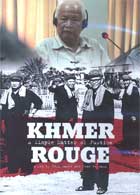
Khmer Rouge: A Simple Matter of Justice 2011
Distributed by Icarus Films, 32 Court St., 21st Floor, Brooklyn, NY 11201; 800-876-1710
Produced by The Factory Productions, Fontana, Arte France, RTBF (Télévision belge)
Directed by Rémi Lainé and Jean Raynaud
DVD , color, 79 min.
Sr. High - General Adult
Asia, Cambodia, Crimes Against Humanity, International Law, Khmer Rouge
Date Entered: 09/09/2014
Reviewed by Cliff Glaviano, formerly with Bowling Green State University Libraries, Bowling Green, OHThis is a comprehensive look at the Extraordinary Chambers in the Courts of Cambodia (ECCC), a special tribunal established by the United Nations and the Cambodian government to investigate and bring to trial surviving officials who allegedly committed crimes against humanity during the Khmer Rouge regime (1975-1979). In 3 years, 8 months and 20 days, Angkar, the group of Khmer Rouge officials that made major decisions, caused the deaths of 1.7 million Cambodians by torture, execution, illness and starvation. Though ousted in 1979, former Khmer Rouge officials remain in Cambodia, sometimes in leadership positions in local government, to the present. The goal of reconciling survivors of the Khmer Rouge regime and those impacted by Khmer Rouge atrocities with former Khmer Rouge members and those officials who may have carried out Angkar’s orders, is effectively the goal of reuniting Cambodia. Thirty years after the Khmer Rouge and with two-thirds of Cambodia’s population born after 1979, the ECCC has the delicate job of establishing responsibility for Angkar’s actions and prosecuting those high Khmer Rouge officials still alive.
Co-Investigating Judges Marcel Lemonde (France) and You Bunleng (Cambodia) are followed as they explore the case of “Comrade Duch” (Kang Kek Iew) the former overseer of the notorious Tuol Sleng (S-21) prison in Phnom Penh. As the only surviving member of Angkar cooperating with the tribunal, “Duch” is the link to establishing the criminal responsibility of four former Angkar members (Nuon Chea, “Brother Number Two” to Pol Pot; Khieu Samphan, President of the State Presidium; Ieng Sary, Deputy Prime Minister and Foreign Minister; and Ieng Thirith, Minister of Social Affairs) for Khmer Rouge atrocities. The filmmakers entwine interviews with the judges, Angkar and Khmer Rouge regime survivors, historians and archivists, together with archival films and photographs providing a detailed account of the ECCC’s procedural dilemma of assigning criminal responsibility, thirty years after the fact. Four Angkar defendants who deny knowledge of the effects of their decisions, are aptly contrasted with the horror of those decisions—resulting in Cambodia’s “Killing Fields.”
Cambodians who suffered under the Khmer Rouge have been invited to serve as plaintiffs in the reconciliation tribunal. It is unclear if plaintiffs will be entitled to compensation for their losses or their suffering from PTSD. Other than prosecuting the five living Angkar members the ECCC may have little effect in reconciling Cambodians alienated by Khmer Rouge atrocities. This film is highly recommended for audiences interested in international law, the prosecution of war criminals, or those who remain curious as to how the world was unable to recognize the reign of terror by the Khmer Rouge during its time in power. For background on the creation of the ECCC see Cambodia: Children of Genocide (2002) and Cambodia: Land of Silence (2004). To better understand the reconciliation process, especially the mistrust between those harmed by the Khmer Rouge and ex-Khmer Rouge officials still in positions of power, see Red Wedding (2012). These three are among a number of excellent films exploring the legacy of the Khmer Rouge reviewed in EMRO.